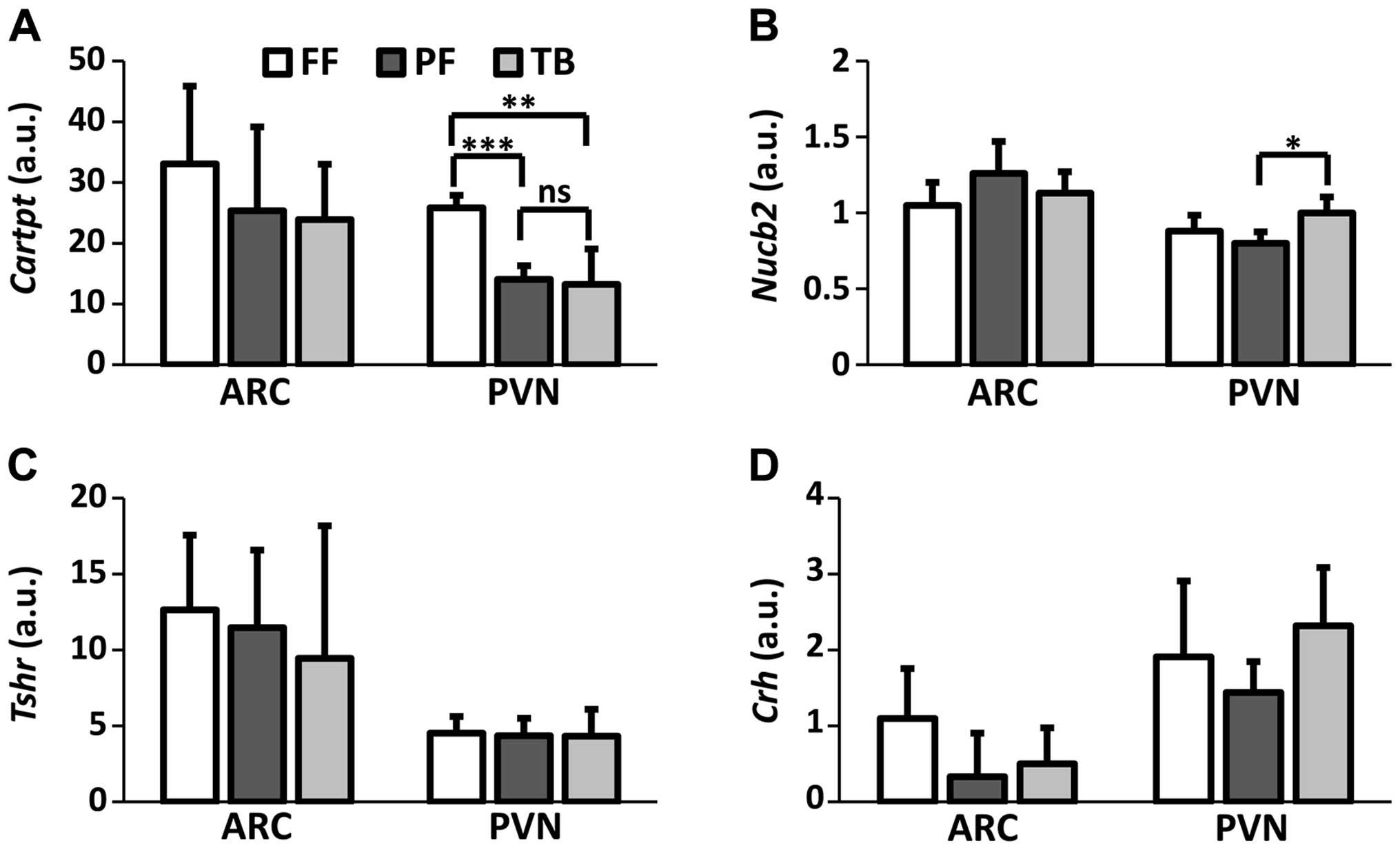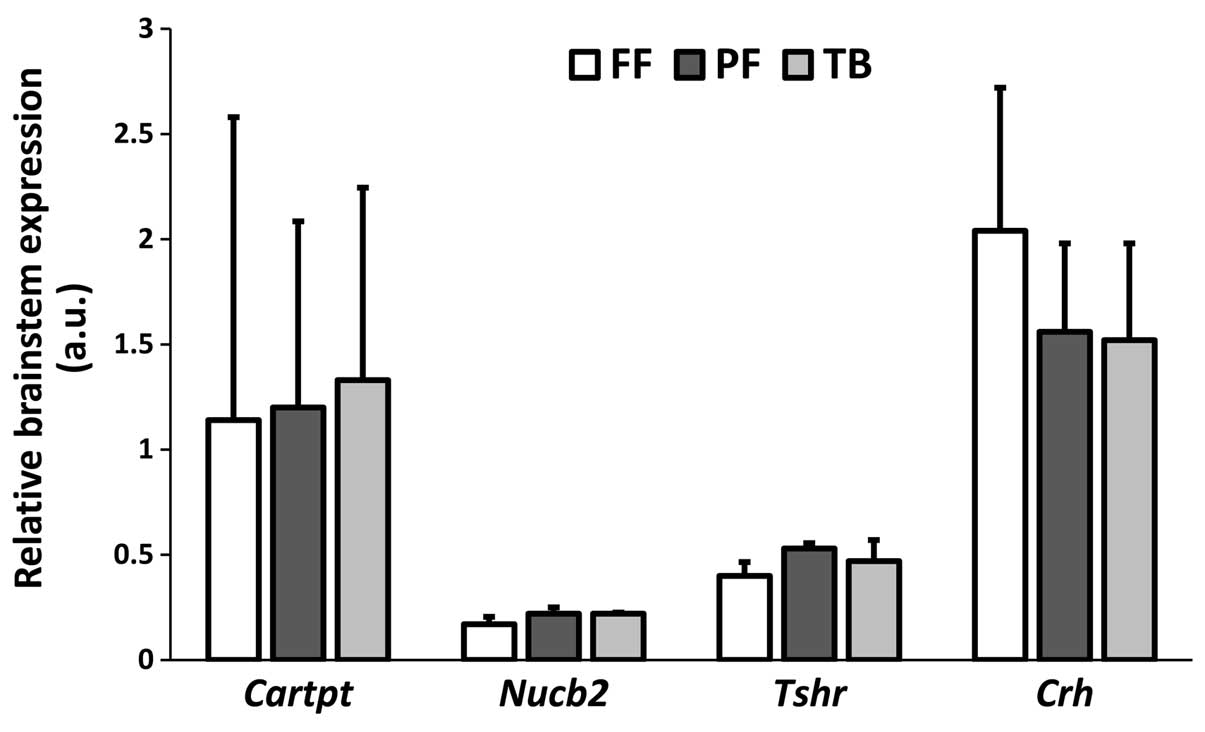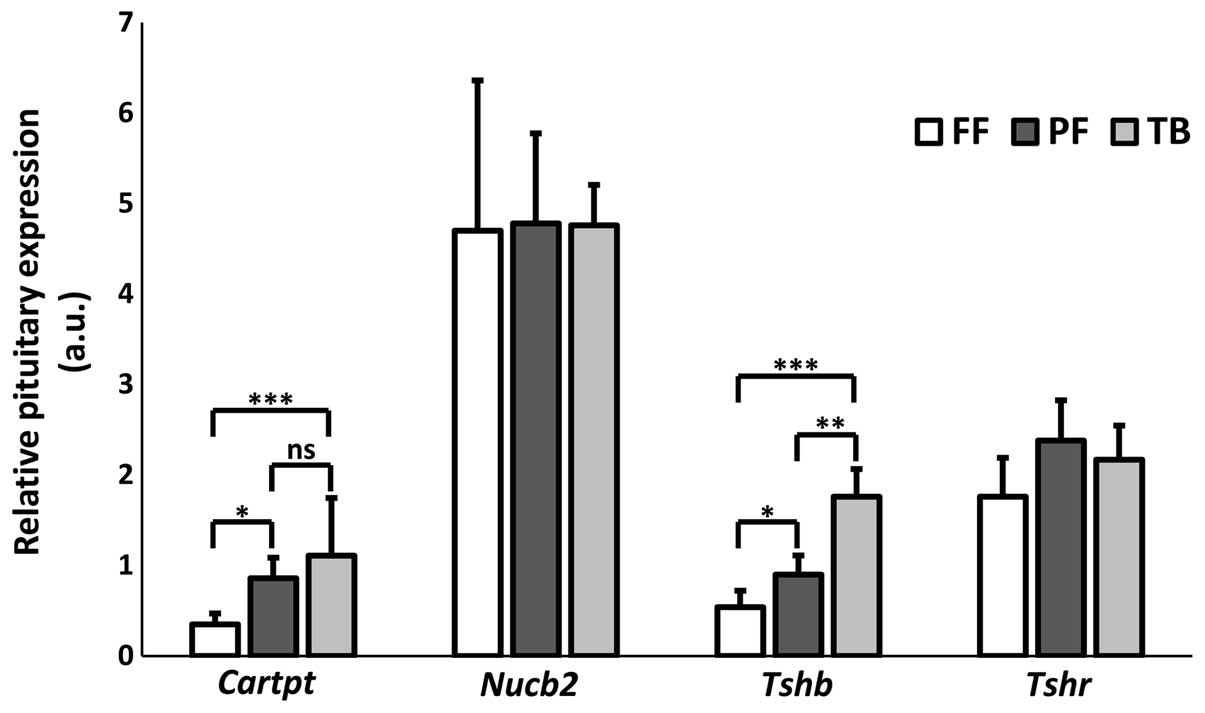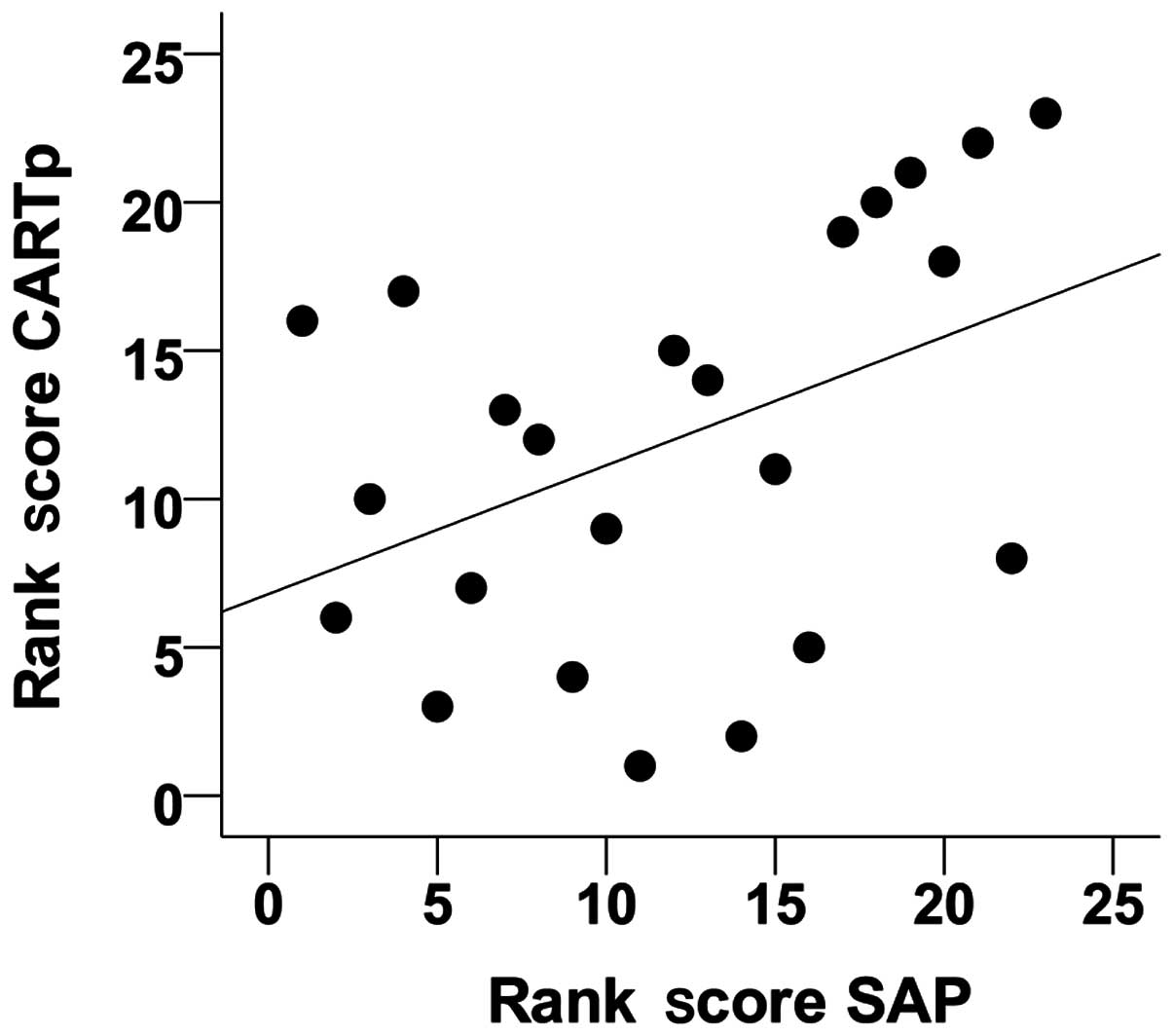|
1
|
Bruera E: ABC of palliative care.
Anorexia, cachexia, and nutrition. BMJ. 315:1219–1222. 1997.
View Article : Google Scholar : PubMed/NCBI
|
|
2
|
Tisdale MJ: Cachexia in cancer patients.
Nat Rev Cancer. 2:862–871. 2002. View
Article : Google Scholar : PubMed/NCBI
|
|
3
|
Tisdale MJ: Cancer cachexia. Curr Opin
Gastroenterol. 26:146–151. 2010. View Article : Google Scholar
|
|
4
|
Fearon K, Strasser F, Anker SD, Bosaeus I,
Bruera E, Fainsinger RL, Jatoi A, Loprinzi C, MacDonald N,
Mantovani G, et al: Definition and classification of cancer
cachexia: An international consensus. Lancet Oncol. 12:489–495.
2011. View Article : Google Scholar : PubMed/NCBI
|
|
5
|
Konsman JP and Blomqvist A: Forebrain
patterns of c-Fos and FosB induction during cancer-associated
anorexia-cachexia in rat. Eur J Neurosci. 21:2752–2766. 2005.
View Article : Google Scholar : PubMed/NCBI
|
|
6
|
Ruud J and Blomqvist A: Identification of
rat brainstem neuronal structures activated during cancer-induced
anorexia. J Comp Neurol. 504:275–286. 2007. View Article : Google Scholar : PubMed/NCBI
|
|
7
|
Lonnroth C, Svaninger G, Gelin J, Cahlin
C, Iresjo B, Cvetkovska E, Edstrom S, Andersson M, Svanberg E and
Lundholm K: Effects related to indomethacin prolonged survival and
decreased tumor-growth in a mouse-tumor model with cytokine
dependent cancer cachexia. Int J Oncol. 7:1405–1413.
1995.PubMed/NCBI
|
|
8
|
Lundholm K, Karlberg I, Ekman L, Edström S
and Scherstén T: Evaluation of anorexia as the cause of altered
protein synthesis in skeletal muscles from nongrowing mice with
sarcoma. Cancer Res. 41:1989–1996. 1981.PubMed/NCBI
|
|
9
|
Cahlin C, Körner A, Axelsson H, Wang W,
Lundholm K and Svanberg E: Experimental cancer cachexia: The role
of hostderived cytokines interleukin (IL)-6, IL-12,
interferon-gamma, and tumor necrosis factor alpha evaluated in gene
knockout, tumor-bearing mice on C57 Bl background and
eicosanoid-dependent cachexia. Cancer Res. 60:5488–5493.
2000.PubMed/NCBI
|
|
10
|
Iresjö BM, Svanberg E and Lundholm K:
Reevaluation of amino acid stimulation of protein synthesis in
murine- and human-derived skeletal muscle cells assessed by
independent techniques. Am J Physiol Endocrinol Metab.
288:E1028–E1037. 2005. View Article : Google Scholar
|
|
11
|
Lin MT, Chu PC and Leu SY: Effects of TSH,
TRH, LH and LHRH on thermoregulation and food and water intake in
the rat. Neuroendocrinology. 37:206–211. 1983. View Article : Google Scholar : PubMed/NCBI
|
|
12
|
Kristensen P, Judge ME, Thim L, Ribel U,
Christjansen KN, Wulff BS, Clausen JT, Jensen PB, Madsen OD, Vrang
N, et al: Hypothalamic CART is a new anorectic peptide regulated by
leptin. Nature. 393:72–76. 1998. View
Article : Google Scholar : PubMed/NCBI
|
|
13
|
Grill HJ, Markison S, Ginsberg A and
Kaplan JM: Long-term effects on feeding and body weight after
stimulation of forebrain or hindbrain CRH receptors with urocortin.
Brain Res. 867:19–28. 2000. View Article : Google Scholar : PubMed/NCBI
|
|
14
|
Oh-I S, Shimizu H, Satoh T, Okada S,
Adachi S, Inoue K, Eguchi H, Yamamoto M, Imaki T, Hashimoto K, et
al: Identification of nesfatin-1 as a satiety molecule in the
hypothalamus. Nature. 443:709–712. 2006. View Article : Google Scholar : PubMed/NCBI
|
|
15
|
Bonnet MS, Djelloul M, Tillement V,
Tardivel C, Mounien L, Trouslard J, Troadec JD and Dallaporta M:
Central NUCB2/nesfatin-1-expressing neurones belong to the
hypothalamic-brain-stem circuitry activated by hypoglycaemia. J
Neuroendocrinol. 25:1–13. 2013. View Article : Google Scholar
|
|
16
|
Schnydrig S, Korner L, Landweer S, Ernst
B, Walker G, Otten U and Kunz D: Peripheral lipopolysaccharide
administration transiently affects expression of brain-derived
neurotrophic factor, corticotropin and proopiomelanocortin in mouse
brain. Neurosci Lett. 429:69–73. 2007. View Article : Google Scholar : PubMed/NCBI
|
|
17
|
Sergeyev V, Broberger C and Hökfelt T:
Effect of LPS administration on the expression of POMC, NPY,
galanin, CART and MCH mRNAs in the rat hypothalamus. Brain Res Mol
Brain Res. 90:93–100. 2001. View Article : Google Scholar : PubMed/NCBI
|
|
18
|
van Zeijl CJ, Surovtseva OV, Wiersinga WM,
Fliers E and Boelen A: Acute inflammation increases pituitary and
hypothalamic glycoprotein hormone subunit B5 mRNA expression in
association with decreased thyrotrophin receptor mRNA expression in
mice. J Neuroendocrinol. 23:310–319. 2011. View Article : Google Scholar : PubMed/NCBI
|
|
19
|
Aydin S: Multi-functional peptide hormone
NUCB2/nesfatin-1. Endocrine. 44:312–325. 2013. View Article : Google Scholar : PubMed/NCBI
|
|
20
|
Maejima Y, Shimomura K, Sakuma K, Yang Y,
Arai T, Mori M and Yada T: Paraventricular nucleus nesfatin-1
neurons are regulated by pituitary adenylate cyclase-activating
polypeptide (PACAP). Neurosci Lett. 551:39–42. 2013. View Article : Google Scholar : PubMed/NCBI
|
|
21
|
Cetinkaya H, Karagöz B, Bilgi O, Ozgün A,
Tunçel T, Emirzeoğlu L, Top C and Kandemir EG: Nesfatin-1 in
advanced lung cancer patients with weight loss. Regul Pept.
181:1–3. 2013. View Article : Google Scholar
|
|
22
|
Kohno D, Nakata M, Maejima Y, Shimizu H,
Sedbazar U, Yoshida N, Dezaki K, Onaka T, Mori M and Yada T:
Nesfatin-1 neurons in paraventricular and supraoptic nuclei of the
rat hypothalamus coexpress oxytocin and vasopressin and are
activated by refeeding. Endocrinology. 149:1295–1301. 2008.
View Article : Google Scholar
|
|
23
|
Hashimoto H, Azuma Y, Kawasaki M, Fujihara
H, Onuma E, Yamada-Okabe H, Takuwa Y, Ogata E and Ueta Y:
Parathyroid hormone-related protein induces cachectic syndromes
without directly modulating the expression of hypothalamic
feeding-regulating peptides. Clin Cancer Res. 13:292–298. 2007.
View Article : Google Scholar : PubMed/NCBI
|
|
24
|
de Rijke CE, Hillebrand JJ, Verhagen LA,
Roeling TA and Adan RA: Hypothalamic neuropeptide expression
following chronic food restriction in sedentary and wheel-running
rats. J Mol Endocrinol. 35:381–390. 2005. View Article : Google Scholar : PubMed/NCBI
|
|
25
|
Nakhate KT, Kokare DM, Singru PS, Taksande
AG, Kotwal SD and Subhedar NK: Hypothalamic cocaine- and
amphetamine-regulated transcript peptide is reduced and fails to
modulate feeding behavior in rats with chemically-induced mammary
carcinogenesis. Pharmacol Biochem Behav. 97:340–349. 2010.
View Article : Google Scholar : PubMed/NCBI
|
|
26
|
Persson H, Bennegård K, Lundberg PA,
Svaninger G and Lundholm K: Thyroid hormones in conditions of
chronic malnutrition. A study with special reference to cancer
cachexia. Ann Surg. 201:45–52. 1985.PubMed/NCBI
|
|
27
|
Svaninger G, Lundberg PA and Lundholm K:
Thyroid hormones and experimental cancer cachexia. J Natl Cancer
Inst. 77:555–561. 1986.PubMed/NCBI
|
|
28
|
Bech P, Winstanley V, Murphy KG, Sam AH,
Meeran K, Ghatei MA and Bloom SR: Elevated cocaine- and
amphetamine-regulated transcript immunoreactivity in the
circulation of patients with neuroendocrine malignancy. J Clin
Endocrinol Metab. 93:1246–1253. 2008. View Article : Google Scholar : PubMed/NCBI
|
|
29
|
Landerholm K, Falkmer SE, Järhult J,
Sundler F and Wierup N: Cocaine- and amphetamine-regulated
transcript in neuroendocrine tumors. Neuroendocrinology.
94:228–236. 2011. View Article : Google Scholar : PubMed/NCBI
|
|
30
|
Landerholm K, Shcherbina L, Falkmer SE,
Jarhult J and Wierup N: Expression of cocaine- and
amphetamine-regulated transcript is associated with worse survival
in small bowel carcinoid tumors. Clin Cancer Res. 18:3668–3676.
2012. View Article : Google Scholar : PubMed/NCBI
|
|
31
|
Jensen PB, Kristensen P, Clausen JT, Judge
ME, Hastrup S, Thim L, Wulff BS, Foged C, Jensen J, Holst JJ, et
al: The hypothalamic satiety peptide CART is expressed in anorectic
and non-anorectic pancreatic islet tumors and in the normal islet
of Langerhans. FEBS Lett. 447:139–143. 1999. View Article : Google Scholar : PubMed/NCBI
|
|
32
|
Okumura T, Yamada H, Motomura W and Kohgo
Y: Cocaineamphetamine-regulated transcript (CART) acts in the
central nervous system to inhibit gastric acid secretion via brain
corticotropin-releasing factor system. Endocrinology.
141:2854–2860. 2000.PubMed/NCBI
|
|
33
|
Skibicka KP, Alhadeff AL and Grill HJ:
Hindbrain cocaine-and amphetamine-regulated transcript induces
hypothermia mediated by GLP-1 receptors. J Neurosci. 29:6973–6981.
2009. View Article : Google Scholar : PubMed/NCBI
|
|
34
|
Tebbe JJ, Ortmann E, Schumacher K,
Mönnikes H, Kobelt P, Arnold R and Schäfer MK: Cocaine- and
amphetamine-regulated transcript stimulates colonic motility via
central CRF receptor activation and peripheral cholinergic pathways
in fed, conscious rats. Neurogastroenterol Motil. 16:489–496. 2004.
View Article : Google Scholar : PubMed/NCBI
|



















